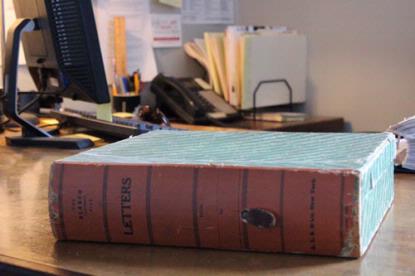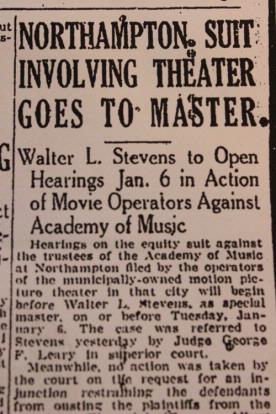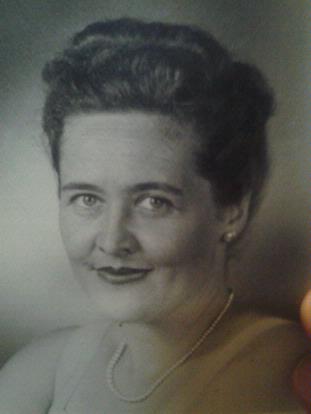
Tucked away under the Academy Front of House Manager’s make-shift desk, in a worn cardboard letter box filled with dated documents and letters, slept a story, an Academy of Music story from 1940 that centered around a strong-willed, spirited woman, named Mildred E. Walker. This box was discovered in late spring of 2012 by then Front of House Manager, Melissa Cleary Pearson, while thoroughly cleaning her office. Excited with the find, she suggested that I take a look. Over the weekend, I brought the box home and read through the stack of documents in one six hour sitting, riveted by the contents and characters that told a story of scandal, power, and politics. I felt inspired by what the documents revealed and felt we had a story that needed to be awakened; we had a play! But first we needed to find out more about those involved.
 Embarking on archival research over the summer of 2012, I set out with Northampton High School student, Claire Mieher, to uncover additional newspaper articles, photographs, and biographical information. Claire and I were awe struck by this lost story of grit and fortitude, of scandal and mystery, which played itself out at the Academy during our nation’s entrance into World War II. After compiling all the information that we could, it was time to commission the work and propose the project to playwright Harley Erdman, theater professor at UMass.
Embarking on archival research over the summer of 2012, I set out with Northampton High School student, Claire Mieher, to uncover additional newspaper articles, photographs, and biographical information. Claire and I were awe struck by this lost story of grit and fortitude, of scandal and mystery, which played itself out at the Academy during our nation’s entrance into World War II. After compiling all the information that we could, it was time to commission the work and propose the project to playwright Harley Erdman, theater professor at UMass.
In the fall, I met with Harley and shared the story of then Academy Manager, Frank Shaughnessy, who was called into military service in 1940. Shaughnessy recommended to the Academy Board of Trustees the lively 16-year veteran cashier, Mildred E. Walker, as interim Manager. However, a woman running the show did not sit well with the national film distribution company that was leasing the building, and they promptly sued the Academy’s board. Meanwhile, new allegations against Mildred emerged from an usher and doorman, accusing her of double-selling tickets. These accusations posed many questions for us: did Mildred take money for personal gain or was she falsely accused because of her new position at the theater? One year after Mildred’s appointment, the decisions handed down by the Superior Court in Springfield left Mildred without a job, the film distribution company without a contract, and the Academy with a new governance model proposed by Mildred that is in place today.

What fascinated me about Mildred was that she was a woman who came from meager means, who had to leave high school to take care of her family, yet she impressed Manager Frank Shaughnessy and the Academy Board of Directors to be left in charge of the prestigious theater, demanding equal pay, and holding her own under controversy. While Betty Friedan was shaping her feminist views as a student at Smith College, Mildred was forging a path for future career-women.
Harley was hooked on this story and began digging deeper into the characters, ultimately locating someone who personally knew Mildred and was in possession of some of her personal belongings, as well as photographs and paintings by her famed photographer lover and then husband, Stephen Johnson. These additional artifacts helped to solidify the skeleton of the play, and the research led to a staged reading of the text this past June for the Northampton Area Young Professionals. Actors performed excerpts from the newly discovered letters, memos, telegrams, affidavits, and newspaper articles that described the conflicts, passions, wrangling and maneuverings over who was going to control the Academy of Music. A discussion with women’s historian, Jacqueline Castledine drew parallels between these historic events and women’s labor history.

Over the next few months, Harley will be wrestling with the unresolved issues (and plot lines!) in the found documents while writing our play and we will hold workshops, begin a history blog on the Academy web site, and offer some panel discussions on women in labor. The play will be stylized in the screwball comedy genre, so popular during the late 30s and early 40s, which gave women strong roles. The actress no longer followed the leading man; he tried to keep up with her, and her rapid repartee. We aim to have a fully staged production in the fall of 2014!
Top three photos courtesy of Northampton Academy of Music; Bottom photo courtesy of the Northampton Area Young Professionals


